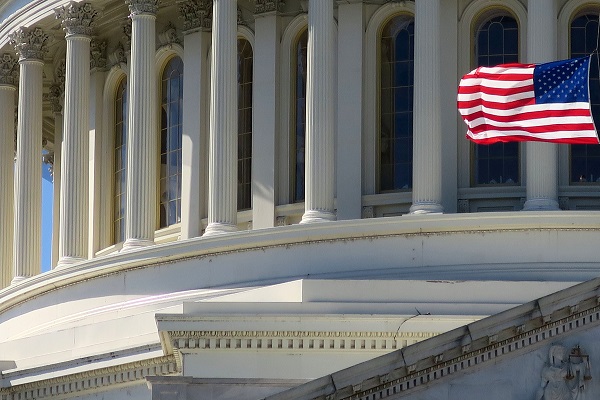 A mark-up of the Retirement Enhancement and SavingsAct would signal that Congress is finally putting its money whereits mouth is on retirement security. (Photo: MikeScarcella/ALM)
A mark-up of the Retirement Enhancement and SavingsAct would signal that Congress is finally putting its money whereits mouth is on retirement security. (Photo: MikeScarcella/ALM)
The House Ways and Means Committee may mark up theRetirement Enhancement and Savings Act as early as next week,according to sources speaking on background. Inquiries to theCommittee's staff were not returned before press time.
|If true, it would be a new reaching point for RESA, which wasfirst introduced in the Senate in the 114th Congress. The bill wasvoted unanimously out of the Senate Finance Committee in Novemberof 2016.
|Reintroduced in both chambers of Congress in February, RESA is an expansive retirement bill thatwould, among other things, do the following:
- allow small employers to join Open Multiple Employer Plans
- create an annuity selection safe harbor for employers thatsponsor retirement plans
- expand tax credits for sponsoring new plans
- allow retirees to continue investing in IRAs after the existingage 70 ½ cap
Supporters of RESA, which has wide bipartisan and bicameralsupport, had reason for hoping it would be included in previous spending packages. But energy for thebill was crowded out by more contentious funding debates.
|“Clearly there is bipartisan support for RESA, and a demand forthe kinds of things that RESA does,” said Phil Waldeck, president of PrudentialRetirement, in an interview.
|Waldeck could not confirm that lawmakers are preparing a mark-upof RESA, but the speculation comes as Prudential has released newsurvey data underscoring American workers' insecurity over theirretirement prospects, particularly among those working for smallemployers.
|Nearly 7 in 10 of all respondents report concerns over havingenough money saved for retirement, and only 39 percent working forsmall businesses say their employer provides the benefits needed tofeel financially secure.
|“This survey shows that Americans are clearly concerned abouttheir financial security,” said Waldeck. “It shows that Americansexpect to be stressed going forward, and they are also stressedabout their children's financial security. This represents a cleardiagnosis of how real Americans are experiencing their financialinsecurity. And that naturally connects to why financial wellnessis so important to individuals, to employers and tosociety. Putting it all together, Americans arefinancially insecure and they are worried about it.”
|According to the Bureau of Labor Statistics, only half ofAmericans that work for an employer with fewer than 50 employeeshave access to a workplace savings plan; 33 percent of Americansemployed by companies with 50 to 100 workers are without access;and nearly 20 percent employed at companies with 100 to 500 workersare without access.
|Respondents to Prudential's survey are overwhelmingly in supportof Congress expanding access to retirement plans.
|The Labor Department is in the midst of finalizing a rule thatattempts to expand access in the small plan market.
|But critics of the proposed version of the rulecontend that it is too narrow because it expressly prohibitsexisting retirement plan providers from sponsoring Open MEPs.Sponsorship of MEPs would be limited toProfessional Employer Organizations or local Chambers ofCommerce.
|But Labor's proposed rule would be superseded if the proposedversion of RESA is ultimately passed. The bill would lift existingLabor Department guidance that requires employers to share a commonnexus, such as affiliation with a trade group, to benefit from theeconomies of scale in joining a multiple employer plan.
|Few, if any, in the retirement services industry think Open MEPswould be a panacea for closing the retirement plan access gap amongsmaller employers.
|Still, there is consensus that Open MEPs could have some impactover time, as the vehicles would leverage the workplace and theefficiencies of automatic enrollment and deferral remittances.
|“The workplace is where it happens,” said Waldeck of utilizingthe greatest efficiencies for improving retirement readiness.“Whether RESA happens in the short term or the longer term, thereis a real opportunity in terms of improving our impact. Evenwithout RESA, however, there is much that employers and retirementproviders like Prudential can do to help Americans become morefinancially secure.”
|Increased public policy spotlight on retirement issues ispromising. But a mark-up of RESA would signal that Congress isfinally putting its money where its mouth is on retirementsecurity.
|“As a society we need to get better at this,” said Waldeck. “Weneed to make it easier for Americans to participate in workplaceprograms that can deliver financial security over time. Theworkplace is the best venue to make an impact. I think if we canget better at this, it will strengthen the fabric of oursociety.”
|READ MORE:
|4 retirement reform bills you need to knowabout
|With Social Security 2100 Act, Rep. Larson says getreform process right, don't rush
|Union pensions: Will Congress kick the can on asolution?
|
Complete your profile to continue reading and get FREE access to BenefitsPRO, part of your ALM digital membership.
Your access to unlimited BenefitsPRO content isn’t changing.
Once you are an ALM digital member, you’ll receive:
- Critical BenefitsPRO information including cutting edge post-reform success strategies, access to educational webcasts and videos, resources from industry leaders, and informative Newsletters.
- Exclusive discounts on ALM, BenefitsPRO magazine and BenefitsPRO.com events
- Access to other award-winning ALM websites including ThinkAdvisor.com and Law.com
Already have an account? Sign In
© 2024 ALM Global, LLC, All Rights Reserved. Request academic re-use from www.copyright.com. All other uses, submit a request to [email protected]. For more information visit Asset & Logo Licensing.








